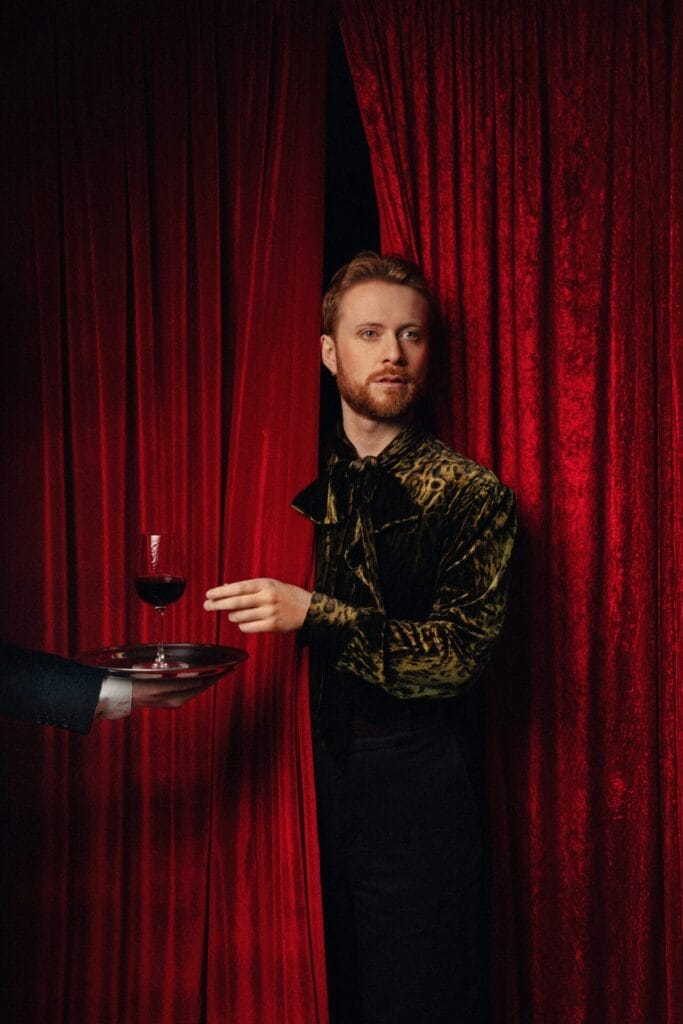Few comedians have a backstory to their Edinburgh Festival Fringe shows quite like John Tothill. From deliberately contracting malaria in a paid clinical trial to fund his 2023 debut, to returning in 2024 only to end up in intensive care after his appendix burst mid-run, Tothill has faced more than his fair share of obstacles on the road to the Edinburgh Festival Fringe. Yet, true to his reputation for wit and resilience, he keeps coming back.
This year, John Tothill returns with This Must Be Heaven, a show that weaves together stories of bodily rebellion, moral misadventure, and playful intellectualism. Blending sharp reflections with mischievous detours, the hour is both deeply personal and gleefully absurd, proving that even the most chaotic experiences can find their place on stage. We caught up with John Tothill to talk about his new show, his health scares, and the curious balance between ambition and self-preservation.
Hi John, we hope you are having a good day today. Your journey to the Edinburgh Fringe has been nothing short of extraordinary, especially with your participation in a paid malaria trial last year. What motivated you to take such a drastic step to fund your show?
It didn’t really feel like a drastic thing to do at the time. I knew I needed an extra few grand, and it was the quickest way to do it. In fact, I think saving money for months and forgoing the joys of life is a more drastic way of getting money.

How did contracting malaria and then experiencing a burst appendix mid-show influence your perspective on the physical demands of a career in comedy?
Standup comedy is a strange one because in some ways it’s a very physical job and in other ways it isn’t at all. If I had been working in a genuinely physically demanding job, I would have gone to the hospital much earlier when my appendix exploded. But, for one hour a day and with enough pain relief, you can frantically gesture at an audience. In future, if something feels wrong, I will go to the doctor much sooner.
Your new show, This Must Be Heaven, has been described as blending high-concept reflections with moments of playful chaos and what the press release cheekily refers to as “nonsense and small talk”. How intentional is that contrast in your work, and how do you approach balancing the intellectually rich with the deliberately ridiculous?
It’s very intentional, but it comes from a natural disposition. I have absolutely no object permanence. If something is in front of me, I’m obsessed with it and I have to have it. If it disappears, I forget about it. That’s why my onstage persona usually comes on with something that needs discussing before immediately being distracted by anything in the room. I think that’s a fair reflection of me.
How did your near-fatal health scare during the 2024 Fringe run change the way you approach live performance and your relationship with your audience?
Going back on stage after my surgery was one of the best days of my life. I had missed the Fringe so much, and I was endlessly happy to be back. I feel like it helped me get better too, because it gave me something to look forward to.

In what ways does This Must Be Heaven explore the tension between creative ambition and physical reality?
I suppose it explores this in the retelling of the story of how I went into the hospital. I couldn’t believe a trifling matter of the body was getting in the way of a good time. Ironically, this caused me to cancel about nine performances in the long run as I became too sick to leave the hospital.
How do you navigate sharing your own health struggles while keeping the tone comedic and self-aware?
My standup persona is very artificial. The stories are entirely real, but they’re told by someone who is essentially not me. So there’s plenty of irony in every line. I’m not a confessional act, so I don’t feel like I’m ‘sharing’ anything as such.
The character of 19th-century oyster thief Edward Dando appears in your show as a metaphor. What drew you to his story, and how does it connect with your own experiences of indulgence and overcommitment?
Edward Dando is the most interesting person I have ever come across. (I forget now how I was made aware of him.) But when I read about his time in solitary confinement after overindulging on stolen oysters, I thought, this is surely a metaphor for my time in hospital last year.

How do you reconcile the urge to “keep going” despite your body’s warnings with the practical need for self-care?
I think I lack executive function to the extent that I do anything other than honour my urges. This will probably end up with more health concerns in the future, unless I figure out a way to change my brain chemistry. But I’m pretty happy as I am.
We imagine that returning to the stage after something as intense as sepsis, on top of a prior malaria trial, must have shifted the way you think about your body, your stamina, and how you pace yourself (in more ways than one, haha). Has that experience influenced how you now move through your day-to-day life, especially when preparing for a demanding run like the Fringe?
I am now more likely to take myself seriously if something feels wrong. I was so convinced for days that this appendix problem was just a tummy ache, and that I should grow up and carry on, that I now feel like I didn’t believe my own body enough. I suppose I do have good stamina, although I can’t bear exercise, so it doesn’t apply to everything.
Have you had to introduce any new routines or forms of self-care since those health events? Whether practical or emotional, what’s actually helped, and what’s still a work in progress?
I don’t take anything as seriously anymore. I was so stressed about going up to the Fringe last year that I forgot that the whole thing is supposed to be fun. There is nothing quite like a near-death experience to put a comedy show into perspective. This year, I am very excited to enjoy Edinburgh as much as I can—perhaps a little more moderately than my debut in 2023—but I am certainly a work-in-progress in this regard.

Do you feel those shifts have impacted your mental well-being or your creativity in any noticeable way? Has anything surprised you about how your body and mind responded to the change?
I wrote quite a lot of comedy in the months after my operation. I think I was soaring with relief, and then this slowed down significantly. Illness is weird because when you’re coming out of a bad patch, you always promise yourself that you’ll never forget what it was like not to be able to do the things you want, and then inevitably you do forget, and you’re back at square one, having a breakdown about what colour shirt to wear onstage. I think I panic less in my everyday life now that I’ve seen what a crisis feels like, but sometimes I catch myself.
Your comedy has been described as “erudite” and “effervescent” by the Guardian, and “intellectually stimulating” and “side-splittingly funny” by EdFestMag. How do you cultivate this distinctive voice, especially when dealing with such personal and potentially heavy subject matter?
I think that if you go for aggressively highbrow, so much so that the persona is standing on stilts, people can see that you’re trying to be ridiculous, and they forgive you. So I try to lean into the idea of the comedy show as a confused lecture. But I hope that, more than that, people feel like they’re watching someone who loves that people have turned up, because that’s the truth of it.
Finally, after everything you’ve been through, what do you hope audiences take away from This Must Be Heaven, beyond the laughs?
I hope they understand that pleasure is something they are entitled to, and that they should indulge in a gluttony for life. Preferably with me, after the show.
Our thanks to John Tothill for taking the time to speak with us about his extraordinary journey and Fringe run. We will always be up for indulging in the gluttony for life with him after any show. This Must Be Heaven promises to be a hilarious, thoughtful, and joyfully unpredictable hour—one that reflects not only his unique comedic voice but also his determination to keep creating, no matter what challenges his body might throw at him.
John Tothill’s This Must Be Heaven runs at the Pleasance Courtyard until August 24 as part of the Edinburgh Festival Fringe. For tickets and more information, visit Pleasance’s website.
Follow John Tothill on social media here:
Share this interview article and tag us @GoodStarVibes to let us know all your thoughts on our interview, on John Tothill and his story, as well as his Edinburgh Fringe Festival show.
Have any thoughts?
Share your reaction or leave a quick response — we’d love to hear what you think!







